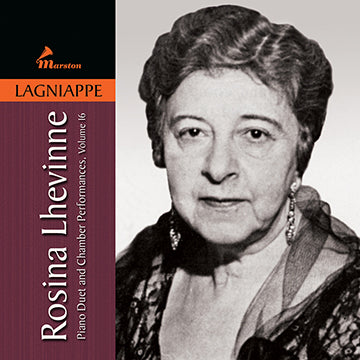Rosina Lhevinne
Piano Duet and Chamber Performances, Volume 16



Total time: (79:09) |
||
| WQXR PIANO DUET STUDIO RECITAL WITH JOSEF RAIEFF, 3 NOVEMBER 1951 | ||
| 1. | Opening commentary | 1:30 |
| MOZART: | ||
| 2. | Theme and Variations in G, K. 501 | 7:37 |
| 3. | Commentary | 0:51 |
| SCHUBERT: | ||
| Fantasy in F Minor, D. 940 | ||
| 4. | Allegro molto moderato | 4:40 |
| 5. | Largo | 3:00 |
| 6. | Scherzo: Allegro vivace | 3:42 |
| 7. | Finale: Allegro molto moderato | 5:25 |
| JUILLIARD SCHOOL OF MUSIC, 28 APRIL 1959 | ||
| MENDELSSOHN: | ||
| Piano Trio No. 1 in D Minor, Op. 49 | ||
| with Oscar Shumsky, violin and Leonard Rose, cello | ||
| 8. | I. Molto allegro ed agitato | 9:25 |
| 9. | II. Andante con moto tranquillo | 6:27 |
| 10. | III. Scherzo: Leggiero e vivace | 3:41 |
| 11. | IV. Finale: Allegro assai appassionato | 8:15 |
| ASPEN MUSIC FESTIVAL, 24 AUGUST 1958 | ||
| MENDELSSOHN: | ||
| Sextet for Piano and Strings in D, Op. 110 | ||
| with Eudice Shapiro violin; William Primrose and Ralph Hersh, violas; Zara Nelsova, cello; and Stuart Sankey, double bass | ||
| 12. | I. Allegro Vivace | 8:38 |
| 13. | II. Adagio | 5:38 |
| 14. | III. Menuetto: Agitato | 2:21 |
| 15. | IV. Allegro vivace | 7:57 |
Producers: Scott Kessler & Ward Marston
Audio Conservation: Ward Marston and J. Richard Harris
Booklet Coordinator: Mark S. Stehle
Booklet Design: Takeshi Takahashi
Marston would like to thank Donald Manildi, Eugene Pollioni, Eric Shumsky, and Eric Wen for providing the source material for this CD.
Marston would like to thank Gregor Benko and Francis Crociata for editorial assistance.
Rosina Bessie was born in Ukraine, the daughter of a Dutch merchant doing business in Kiev. The Czar’s assassination in 1881 unleashed three days of violent anti-Semitic riots, and many Jewish families like the Bessies moved to Moscow. She was a prodigy at the piano and took lessons from a piano student at the Moscow Conservatory, Josef Lhevinne, who was five years older. Later she became a student at that Conservatory and studied with Josef’s teacher, Vassily Safonov. She graduated in 1898 with a gold medal, just as Josef had done in 1892. That same year (1898) she married Josef Lhevinne and he went on to a great international career as a virtuoso pianist. Once when someone heard her and exclaimed that she a better pianist than her husband she was horrified, and vowed from that moment on never to play solo again. She performed only with him as his duo-piano partner until after his death in 1944. Both had been teachers in New York at the precursor to the Juilliard School. She continued teaching and became the most successful “Piano Madame” of her day, her list of students including Josef Raieff and others who went on to become concert artists. In the autumn and winter of her life she had a great career as an educator, but she was much less active as a soloist and her recorded legacy is small—a pity that especially comes to mind when hearing some of her solo work, such as the beginning of the second movement of the Mendelssohn Trio.